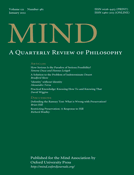-
Views
-
Cite
Cite
David Wiggins, Practical Knowledge: Knowing How To and Knowing That, Mind, Volume 121, Issue 481, January 2012, Pages 97–130, https://doi.org/10.1093/mind/fzs026
Close - Share Icon Share
Abstract
Ryle’s account of practical knowing is much controverted. The paper seeks to place present disputations in a larger context and draw attention to the connection between Ryle’s preoccupations and Aristotle’s account of practical reason, practical intelligence, and the way in which human beings enter into the way of being and acting that Aristotle denominates ethos. Considering matters in this framework, the author finds inconclusive the arguments that Stanley and Williamson offer for seeing knowing how to as a special case of knowing that. The paper then explores certain implications of the author’s position for the philosophy of mind and the grammatical analysis of constructions involving ‘know how to’. It ends with a neo-Rylean remark about Aristotelian nous.



